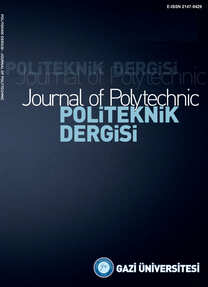Analysis, test and management of the metaheuristic searching process: an experimental study on SOS
Meta-Sezgisel Arama Sürecinin Analiz, Test ve Yönetimi: SOS Üzerine Deneysel Bir Çalışma
___
[1] Blum C. and Roli A., “Metaheuristics in combinatorial optimization: Overview and conceptual comparison”, ACM Computing Surveys, 35(3): 268-308, (2003).[2] Yang X.S., Scholarpedia, 6(8):1147, (2011).
[3] Lin, A., Sun, W., Yu, H., Wu, G., & Tang, H., “Global genetic learning particle swarm optimization with diversity enhancement by ring topology”, Swarm and evolutionary computation, 44: 571-583, (2019).
[4] Ali, A. F., Tawhid, M. A., “A hybrid particle swarm optimization and genetic algorithm with population partitioning for large scale optimization problems”, Ain Shams Engineering Journal, 8(2): 191-206, (2017).
[5] Dorigo M., “Optimization, Learning and Natural Algorithms”, PhD thesis, Politecnico di Milano, (1992).
[6] Chen, Z., Zhou, S., & Luo, J., “A robust ant colony optimization for continuous functions”, Expert Systems with Applications, 81: 309-320, (2017).
[7] Dorigo M. and Stützle T., “Ant Colony optimization”, MA: MIT Press, Cambridge, (2004).
[8] Jana, B., Mitra, S., & Acharyya, S., “Repository and Mutation based Particle Swarm Optimization (RMPSO): A new PSO variant applied to reconstruction of Gene Regulatory Network”, Applied Soft Computing, 74: 330- 355, (2019).
[9] Mason, K., Duggan, J., & Howley, E., “A meta optimisation analysis of particle swarm optimisation velocity update equations for watershed management learning”, Applied Soft Computing, 62: 148-161, (2018).
[10] Rajabioun R., “Cuckoo Optimization Algorithm”, Applied Soft Computing, 11:5508-5518, (2011).
[11] Harfouchi, F., Habbi, H., Ozturk, C., & Karaboga, D., “Modified multiple search cooperative foraging strategy for improved artificial bee colony optimization with robustness analysis”, Soft Computing, 1-24, (2017).
[12] Karaboga, D., Kaya, E., “An adaptive and hybrid artificial bee colony algorithm (aABC) for ANFIS training”, Applied Soft Computing, 49: 423-436, (2016).
[13] Sun, G., Ma, P., Ren, J., Zhang, A., & Jia, X., “A stability constrained adaptive alpha for gravitational search algorithm”, Knowledge-Based Systems, 139: 200-213, (2018).
[14] Kahraman H. T., Sagiroglu S., and Colak I., “The development of intuitive knowledge classifier and the modeling of domain dependent data”, Knowledge Based Systems, 37: 283-295, (2013).
[15] Rao R.V., Savsani V.J, and Vakharia D.P., “Teaching– learning-based optimization: A novel method for constrained mechanical design optimization problems”, Computer-Aided Design, 43: 303–315, (2011).
[16] Cheng M.Y., and Prayogo D., “Symbiotic Organisms Search: A new metaheuristic optimization algorithm”, Computers and Structures, 139: 98–112, (2014).
[17] Trana D.H., Cheng M.Y., and Prayogo D., “A novel Multiple Objective Symbiotic Organisms Search (MOSOS) for time–cost–labor utilization tradeoff problem”, Knowledge-Based Systems, 94: 132–145, (2016).
[18] Meng A., Li, Z., Yin, H., Chen, S., and Guo, Z., “Accelerating particle swarm optimization using crisscross search”, Information Sciences, 329: 52–72, (2016).
[19] Wang Z., Xing H., Li T., Yang Y., Qu R., and Pan, Y., “A Modified Ant Colony Optimization Algorithm for Network Coding Resource Minimization”, IEEE Transactions on Evolutionary Computation, 20(3): 325- 342, (2016).
[20] Lin Q., Chen J., Zhan Z.H., Chen W.N., Coello C.A.C., Yin Y., Lin C.M., and Zhang J., “A Hybrid Evolutionary Immune Algorithm for Multiobjective Optimization Problems”, IEEE Transactions on Evolutionary Computation, 20(5): 711-729, (2016).
[21] Seçkiner S.U., Eroğlu Y., Emrullah M., and Dereli T., “Ant colony optimization for continuous functions by using novel pheromone updating”, Applied Mathematics and Computation, 219(9): 4163-4175, (2013).
[22] Civicioglu P., “Backtracking search optimization algorithm for numerical optimization problems”, Applied Mathematics and Computation, 219(15): 8121-8144, (2013).
[23] Topal A. O., and Altun O., “A novel meta-heuristic algorithm: Dynamic Virtual Bats Algorithm”, Information Sciences, 354: 222-235, (2016).
[24] Baykasoğlu A., and Akpinar Ş., “Weighted Superposition Attraction (WSA): A swarm intelligence algorithm for optimization problems–Part 1: Unconstrained optimization”, Applied Soft Computing, 56: 520-540, (2017).
[25] Özkış A., and Babalık A., “A novel metaheuristic for multi-objective optimization problems: The multiobjective vortex search algorithm”, Information Sciences, 402: 124-148, (2017).
[26] Babalik A., Ozkis A., Uymaz S.A., and Kiran, M.S., “A multi-objective artificial algae algorithm”, Applied Soft Computing, 68: 377-395, (2018).
[27] Aydilek İ.B., “A hybrid firefly and particle swarm optimization algorithm for computationally expensive numerical problems”, Applied Soft Computing, 66: 232- 249, (2018).
[28] Melki G., Kecman V., Ventura S., and Cano A., “OLLAWV: OnLine Learning Algorithm using WorstViolators”, Applied Soft Computing, 66: 384-393, (2018).
[29] Zhang J., Xiao M., Gao L., and Pan Q., “Queuing search algorithm: A novel metaheuristic algorithm for solving engineering optimization problems”, Applied Mathematical Modelling, 63: 464-490, (2018).
[30] Trunfio G.A., Topa P., Was J., “A new algorithm for adapting the configuration of subcomponents in largescale optimization with cooperative coevolution”, Information Sciences, 372: 773–795, (2016).
[31] Karafotias G., Hoogendoorn M., and Eiben A.E., “Parameter Control in Evolutionary Algorithms: Trends and Challenges”, IEEE Transactions on Evolutionary Computation, 19(2): 167-187, (2015).
[32] Sun G., Zhang A., Yao Y., and Wang Z., “A novel hybrid algorithm of gravitational search algorithm with genetic algorithm for multi-level thresholding”, Applied Soft Computing, 46: 703–730, (2016).
[33] Sahin, O., Akay, B., “Comparisons of metaheuristic algorithms and fitness functions on software test data generation”, Applied Soft Computing, 49: 1202–1214, (2016).
[34] Gupta, S., & Deep, K. “A novel random walk grey wolf optimizer”, Swarm and evolutionary computation, 44: 101-112, (2019).
- ISSN: 1302-0900
- Yayın Aralığı: 6
- Başlangıç: 1998
- Yayıncı: GAZİ ÜNİVERSİTESİ
The Effect of Organic Waste Potential of Mersin Province on Biogas Energy Production
Bekir YELMEN, Metin DAĞTEKİN, M. Tarık ÇAKIR
Oguz TURGUT, Edaviye Sare AKBAY, Berkay DERELI
Diffusion Welding of Al-α-Si3N4 Composite Materials
Halil ARIK, İbrahim Okan ERDEN, Mustafa AYDIN
Muharrem PUL, Volkan BAYDAROĞLU
Evaluation of Applicability of Thermophotovoltaic System in Combi Boiler
MURAT TUYAN, Kübra Sevcan SOYKAN, İrem NAMAL, Özge ANDIÇ ÇAKIR
Akım İşlemsel Kuvvetlendiricisi Tabanlı GerilimModlu MOS-C Tüm-Geçiren Süzgeç ve Uygulaması
Ahmet GÖKÇEN, Hasan ÇİÇEKLİ, İhsan KARACAN
Akıllı Bir Şebekedeki Risk İndikatörlerinin Bulanık Analitik Hiyerarşi Prosesi ile Modellenmesi
İlter Şahin AKTAŞ, TAYFUN MENLİK, Adnan SÖZEN
Analysis, test and management of the metaheuristic searching process: an experimental study on SOS
Hamdi Tolga KAHRAMAN, Sefa ARAS, Yusuf SÖNMEZ, Uğur GÜVENÇ, EYÜP GEDİKLİ
İyonosferik Plazmadaki Empedansın Mevsimsel Değişimi
İbrahim ÜNAL, Aybaba HANÇERLİOĞULLARI, Seçil KARATAY, Ali YEŞİL
